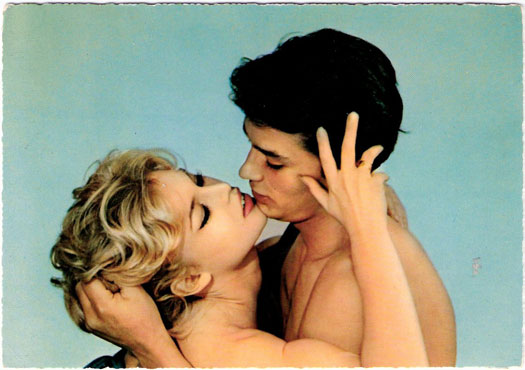Of course, the Frenchman in the movie is inordinately sexy. He is tall and lean and sports the sort of stubble that looks so ruggedly masculine from the back row it’s easy to forget it feels like sandpaper in real life. When he leans into the elevator to convince the woman to stay at the party for just one more drink, his accent is heavy enough to induce swooning without being so heavy as to be impenetrable. She stays for many more drinks. Every woman in the darkened theatre wants to be her. We want to be awash in the charm of a handsome foreigner who, if we were to say, “What are you doing in the States?” might respond, “I came here to meet you.” We imagine that, like the movie heroine, we would have the self-respect to roll our eyes, but we see she is charmed in spite of herself and we don’t blame her. If an American man handed us a line like that, we would vomit quietly into our handbags—but the Frenchman’s vowels make us giddy. We know what to do if some macho creep “hey baby’s” us on the street, but when a handsome foreigner tells us “tu es charmante” we go, secretly, all to pieces. For some reason, perhaps because in our hearts we believe we truly are charmante, the man who speaks such a line is not a guy trying to get laid, but a man of astonishing depth, intelligence, and sensitivity; therefore, when he inevitably does get laid, it is only just and reasonable. American men typically do not enjoy these films.
For comic effect, the movie will feature scenes illustrating some droll cultural clashes. He smokes and she doesn’t. She obeys traffic laws; he is unable to drive under 98 miles per hour. His diet is comprised entirely of offal and carbs; she sees nothing oxymoronic in the phrase “main-course salad.” No matter. After each misunderstanding, they fall laughingly into each other’s arms, eat some pastries, share a cigarette, and make love. Again.
After two years of dating a clean-shaven, nonsmoking Frenchman, I can attest there is some truth in the movies. Yes, there is romance and sex appeal. We also consume a great deal of bread; however, the movies don’t reveal the more important truths about dating a foreigner. For example, they don’t mention the shock you will experience when your boyfriend—who, like you was born in the ’70s—looks up from a magazine and asks, “What the hell is the Brady Bunch?”—pronouncing “Brady” with a short “a.” Or that he will be entirely unamused by any jokes that feature Gary Coleman. Or that he will be unable to share your disdain of the Grateful Dead and all its patchouli-scented associations, because shockingly, albeit delightfully, he has never heard of the Grateful Dead.
What’s more, not one of these movies includes a scene in which the heroine is obliged to explain a knock-knock joke. Not a particular knock-knock joke, but the very concept of knock-knock jokes.
“Are you familiar with knock-knock jokes?” I asked him.
“Sort of,” he replied.
“I mean, do you know how they go?”
“Not really.”
“Well, do you know what to say after ‘Knock, knock?’“
“Who’s there?”
“Right!” I said, in that proud tone usually employed by parents of very small children who have accomplished something rudimentary. “OK, ready? Knock, knock.”
“Who’s there?”
“The interrupting cow.”
“The interrupting cow?” he repeated incredulously.
“Yes. OK. Let’s start again. Knock, knock.”
“Who’s there?”
“The interrupting cow.”
“…”
“Well?” I prompted.
“Well what?”
“You have to say ’The interrupting cow who?’“
“Oh.”
“How do you not know this?”
“Well, I’m sorry.”
“OK. Let’s start again. Are you clear on your lines?”
“Yes.”
“Good. Here we go. Knock, knock.”
“Who’s there?”
“The interrupting cow.”
“The interr—”
“MOO!”
“—upting cow who? What did you say?”
“I said ‘moo.’ That’s it. That’s the joke. I’m the interrupting cow, right? So I interrupt you and say ‘moo.’ That’s it.”
“Oh. OK. I didn’t hear what you said.”
Silence
“That didn’t really work, did it?” I said.
“No, not really.”
In reality, we spend a great deal more time having conversations like this than we do murmuring French endearments in each other’s ears. In general, we’re more successful with nonverbal communication. Sadly, though, it turns out that in real life, “nonverbal” isn’t necessarily a euphemism for “sexual.” After spending years crafting what I like to think of as a rather dashing satirical wit, I am somewhat startled to find that, to reach common ground, I must lower myself even further than the knock-knock oeuvre. Indeed, the dark secret is that my enviable, cinematic relationship traces its influences more directly to the Three Stooges than to French Kiss. Take away the poking, tickling, silly faces, and, comically exaggerated mime and we are lost. Unsurprisingly, the unflagging physical comedy is quite taxing. Fortunately, though, when we grow too weary to blow raspberries on each other’s bellies, we have those carbs close at hand to revive our energy. Tu es charmante. Je t’adore. Please pass the baguette.



